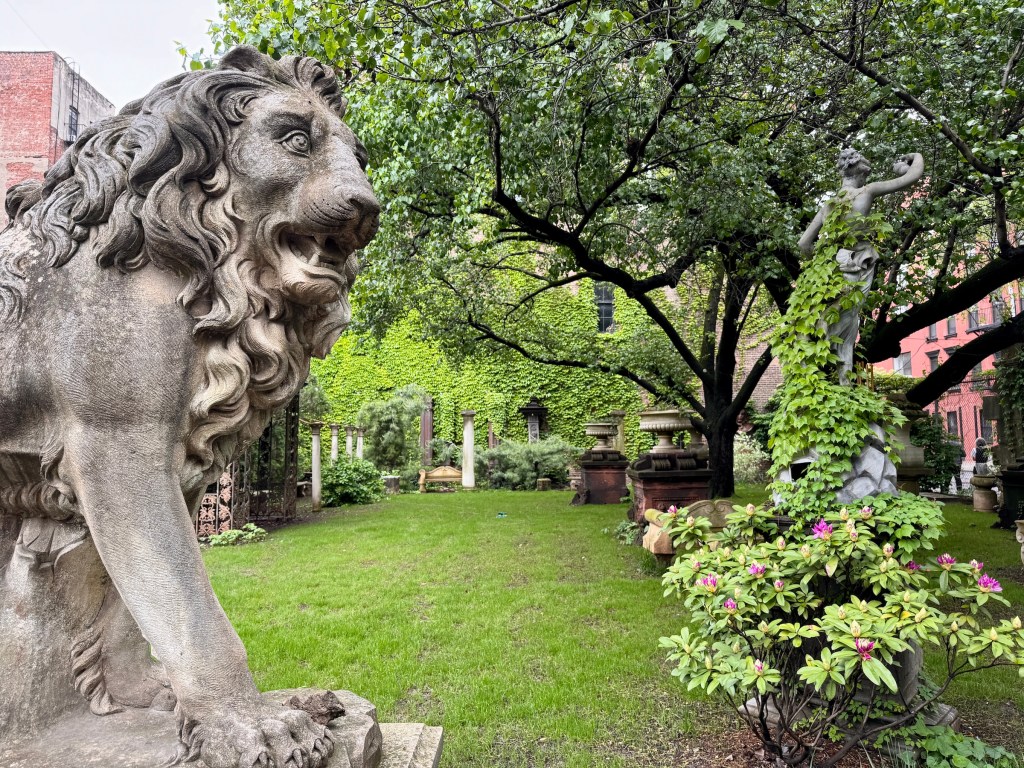New York’s Elizabeth Street Garden Saved From Demolition


New York City no longer plans to flatten Manhattan’s Elizabeth Street Garden after years of community resistance to a project that would convert the beloved green space into an affordable housing development.
Several legal challenges and a campaign to save the garden had delayed its eviction. Today, June 23, the city announced that it reached a deal with Councilmember Christopher Marte to build approximately 620 affordable housing units at three alternative sites in Lower Manhattan, First Deputy Mayor Randy Mastro told journalists in a news conference.
The Nolita neighborhood sculpture garden, which sits on a city-owned lot, was served an eviction notice in October in preparation for the construction of Haven Green, a development that would have supported 123 units of affordable housing for low-income LGBTQ+ seniors by 2027. But advocates for the garden long argued that affordable housing should not come at the cost of one of the city’s few green spaces.
The deal will spare the garden, and build around five times more affordable housing in the area than the Haven Green development included.
“This is called using your heart and your head, listening to communities and furthering the agenda of affordable housing,” Mastro said at the news conference.
Mastro, who was appointed by the Adams in March, said that 123 affordable housing units would be built at 156–166 Bowery, just a couple of blocks from the garden; around 200 units at nearby 22 Suffolk; and at least 300 additional units at the city-owned development at 100 Gold Street.
The agreement stipulates that Elizabeth Street Garden must remain open to the public from 8am to 8pm daily (the space had previously limited visiting hours past 6pm or sunset). The deal also includes an option for the garden to become part of the New York City Department of Parks and Recreation at a later time.
While the number of seniors on the waitlist for affordable housing in New York City climbed to troublesome heights, the garden’s executive director, Joseph Reiver, told Hyperallergic last fall that pitting the art garden’s existence against the need for homes is a “false choice.” Reiver explained that he was working tirelessly to fight for affordable housing in the neighborhood at other sites.
This week’s agreement hinges on the successful rezoning of the properties with cooperation from Councilmember Marte, Mastro said. Should the rezonings fall through, he added, the city reserves the right to the garden property. Final zoning changes are determined by City Council. Mastro said the city is working with a private developer who has forfeited plans to build market-rate apartments in favor of city-subsidized housing at the 156–166 Bowery project.
The space, stewarded by Reiver and the nonprofit Elizabeth Street Garden, has relentlessly attempted to stave off eviction for over a decade. Reiver’s father Allan, who owned the former Elizabeth Street Gallery, leased the plot from the city on a month-to-month basis. The garden is also home to several Neoclassical sculptures and a gazebo designed by the Olmsted Brothers.
Tensions rose in 2012, when the Department of Housing Preservation and Development assumed control of the lot and began an inquiry into redeveloping it. The garden’s eviction has been delayed while various courts considered bids to protect the garden from destruction, including under the Visual Artists Rights Act (VARA). The law grants public artwork creators authorship over their works and prevents their destruction.
Lawyers argued in February that the garden itself was a work of Outsider art and a “social sculpture,” warranting protection. Reiver welcomed the new deal in an Instagram post.
“We remain fully devoted to ensuring that Elizabeth Street Garden is preserved in its entirety, with all of its enduring magic as we know and love in perpetuity,” Reiver wrote.





